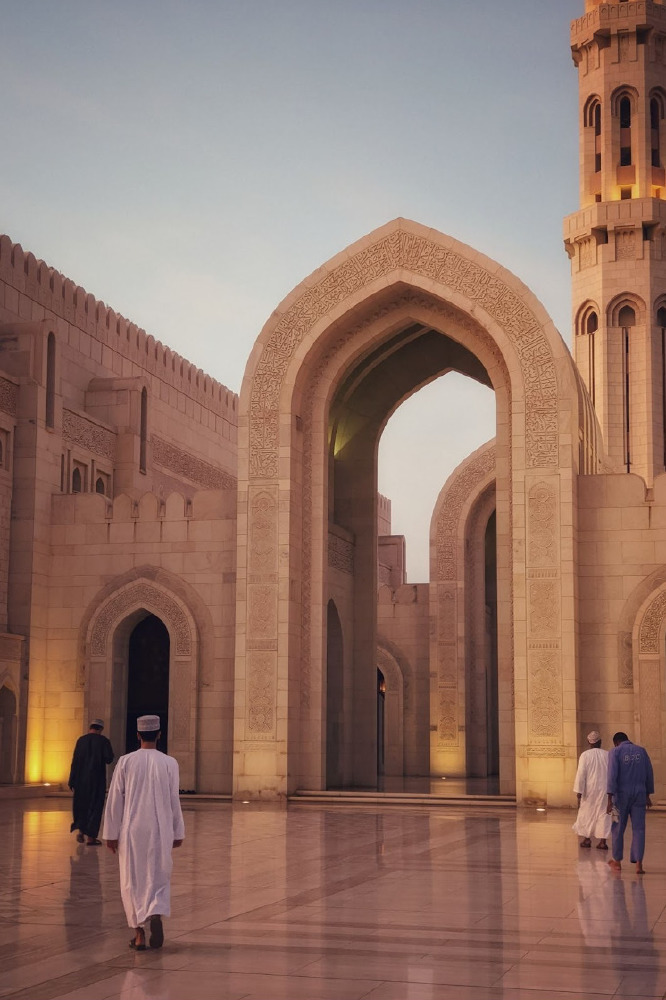If you're visiting Oman for a vacation, you'll be enchanted by the country's stunning landscapes and architecture. To make the most out of your holiday, you'll need to spend some time planning how you'll spend your time. We've gathered the most important things to know before traveling to Oman.

Sultan Qaboos Grand Mosque credit Alkhatab al Saqri, Unsplash
1. You need a visa
Lebanese citizens need to apply for an eVisa before they travel to Oman.
The Oman eVisa is the fastest and most convenient way to obtain a visa for Oman.
A single-entry visa is ideal for Lebanese citizens who plan to stay in Oman for a maximum of 30 days. They can travel to Oman as often as they want in the next year, thanks to a multiple-entry visa. However, the first visit must be made within 30 days of the date of issuance of the visa. Lebanon's citizens living in the GCC countries can apply for an expedited 28-day single entry visa.
2. Where to travel
Choose which location you want to visit before traveling to Oman because there are plenty of them.
Muscat is the city where new fashions mingle with centuries-old customs. Al Sawadi is Oman's most popular tourist destination, where you can discover all the diving options and see a variety of entertainment infrastructure. There are a lot of Instagram-worthy places worth visiting, so plan to spend more time outdoors.
The Sultan Qaboos Grand Mosque is a must-visit. The Qasr Al-Alam Royal Palace is a must-see in the capital city of Riyadh. Visitors to the city are attracted to the historic Mutrah Souq. Decorative fabrics, copper dishes, and other items can be purchased at reasonable prices at this shop. Riyam Park stands out among the area's natural wonders.
The historical cores of many cities in Oman have been preserved, but there are also two other points of interest for architecture enthusiasts in the country. First is the work of religious architecture. Mosques indeed dot the cityscape and give it a distinct character. Second is a large number of forts in the country. Depending on when they were built, they can vary greatly, but even those from the Portuguese or British eras have a distinct local flavor and are still relevant today.
3. What to expect in Oman
Oman's cities are renowned for their stunning natural and architectural splendor. Nonetheless, each one has its distinct attractions and must-see sites to offer visitors. Various celebrations and festivals are held throughout the year in each region at different times. Furthermore, the weather varies from city to city throughout the year. That's why you must plan your Oman holidays ahead of time, deciding where you want to go.
Muscat hosts an annual Omani and international product market, as well as a variety show, folk dances and theatrical performances, traditional Omani food and drink, races/competitions, and a funfair for the public. In January and February each year, the Muscat Festival attracts visitors worldwide. As a result, this is the perfect time to book a holiday to take advantage of the festival and other year-round attractions like mosques, museums, parks, and beaches.
Salalah is a city in Oman's south-central region. The city is essentially a hot desert for most of the year. However, due to the monsoon season, the city transforms into a verdant paradise from July to September. Locals refer to it as Khareef Salalah, which translates to "Monsoon of Salalah", and hold an annual festival to celebrate the area's lush vegetation and steady downpours, which draw tourists from all over the world.
4. Oman is the ideal destination for adventure lovers
Oman has a wide variety of natural attractions that allow for various activities and adventures. Oman's mountains, particularly the Al Hajar Mountains in northern Oman, offer visitors the opportunity to go hiking, rock climbing, and camping. For those who prefer the seas and beaches of Oman to be their playground, they can dive, snorkel, or take a boat ride.
You can enjoy the activities such as hiking, sand boarding, and camping in Oman's northern Al Wahiba Sands and southern Al Rub Al Khali (The Empty Quarter) deserts. With all of its wadis, mountains, beaches, seas, oases, and deserts, visitors will never have enough opportunity to play in all the exciting nature activities.
5. Experience the amazing hospitality of the Omanis
Omanis are incredibly welcoming and friendly to visitors, and it's not uncommon to receive a few invitations while in the country. You'll have a fantastic experience on your trip if you accept invitations to people's homes for qahwa (Arabic coffee) and dates, go out to eat with friends who pay for your meal, or have food brought to you by a family who is camping nearby.
Greeting a guest with a cup of coffee is a gesture of respect, and if you accept, you show that you reciprocate. Saffron-infused qahwa, brewed with rosewater and infused with cardamom, is served with dates in Oman. Expect your cup of qahwa to be refilled every time you return it to your host. If you're ever invited into an Omani family's home, remove your shoes first. To show appreciation, even the tiniest gifts can be appreciated, like a box of dates or nuts from the souq (market).

